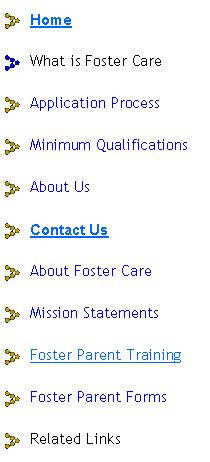





|
What is Foster Care |
|
Who are the Children Who Need Homes? In the Province of Alberta, there are normally between 5,000 to 6,000 children in approximately 1,800 foster homes, under the authority of the Ministry of Edmonton and Area Child and Family Services. Most children who come into care return to their birth families. These children need foster families willing to provide them a loving and stable temporary family, until issues are resolved to enable the children to return home. Significant numbers of children come into care with a high probability of becoming permanent wards. Ideally these children can be placed immediately into foster families that would be able and willing to adopt the children when they cannot return home. In such cases, foster homes can make it possible for the children’s first placement to also be their last.
When Does a Child Come Into Care? A caseworker from the Regional Child and Family Services Authority becomes involved with a family when: · a member of the community (a neighbor or teacher) reports his or her concerns about a child’s safety or well-being; · the family seeks help because it is having difficulty protecting or caring for their child.
After meeting with the family and assessing the child’s and family’s needs, the Child Protection Worker makes recommendations about further involvement with the family. The child is removed from the family only when all reasonable attempts to protect and meet the child’s needs within the community have been exhausted.
Matching Children/Youth with a Foster FamilyThe first step in matching a child/youth to a foster home is to decide what the child/youth needs. Once this is determined we take the needs of the child/youth and the strengths and preferences of the foster family into account. Foster families are given information to help ensure that the child placed in their home fits with the family and the skill level of the Foster Parent(s). Before a child is placed in a home, you need to decide whether or not you are prepared to accept the placement.
Natural Family A primary goal of fostering is to provide a child with alternate family care until they can return to their natural family, alternative family setting or an independent living situation. One of the responsibilities of a foster family is to support and encourage contact between the natural family and the child, whenever safe for the child. Your involvement with the natural family is sometimes necessary to prepare the child for his or her return home and to keep the child and family connected. You may work with the natural parents on matters that affect the child.
Children/Youth from Other Cultures When a child/youth of a different cultural background is placed in your home, it is important to discuss with the child’s Social Worker if there are any special needs in relation to his or her heritage. CHILDREN FIRST will provide an Aboriginal Awareness course to will assist you in supporting the child’s need to explore cultural values and ethnic attitudes. If a child is a member of a band or Métis settlement, decisions regarding the child are to be made in consultation with the band or settlement. The child’s Social Worker will be responsible for coordinating this communication.
Confidentiality It is important that foster families respect and protect each child’s right to confidentiality. Just as agencies and Social Workers are bound by the Family Enhancement Act in sharing of information with others, so are Foster Parents. Foster families can share information with other professionals assisting in the child care such as CHILDREN FIRST, doctor, or psychologist. All Foster Parents will sign an Oath of Confidentiality.
Record Keeping The Foster Parent’s observations and information is invaluable when caring for child. Since this information is so important each Foster Parent will be given an orientation towards record keeping. CHILDREN FIRST will provide all the necessary paperwork that is to be completed and returned to the office on Monthly basis. All documentation is considered “legal” and can be used in court. Effective documentation is your best defense against false allegations.
Service Plan The development and completion of Service Plans are the responsibility of the child’s Social Worker and your Support Worker. The Service Plan details goals, tasks roles and expectations. The Plan specifies what supports and actions are required so the child may return to his or her family or be placed in an alternative arrangement. A clear plan may help reduce the child’s anxiety and uncertainty about what will happen to him or her while in foster care.
Case Conference / Service Team Meeting A Case conference is an informal or formal meeting which brings together the Foster Parent(s), and other individuals who have information to share in regards to the child in care. The purpose of the meeting is to share information that will give those involved an opportunity to contribute in planning for the child. The opinion of Foster Parents is welcome and essential in helping to broaden everyone’s understanding of the child. Case Conferences are often held during the day; however, Social Workers are usually willing to work with Foster Parents to reach a mutually agreed time. |


